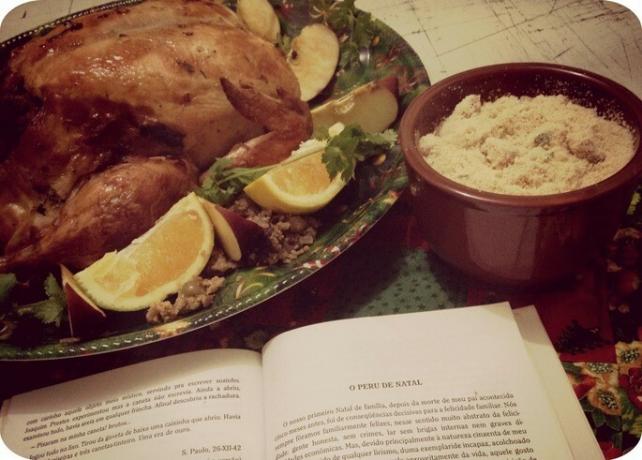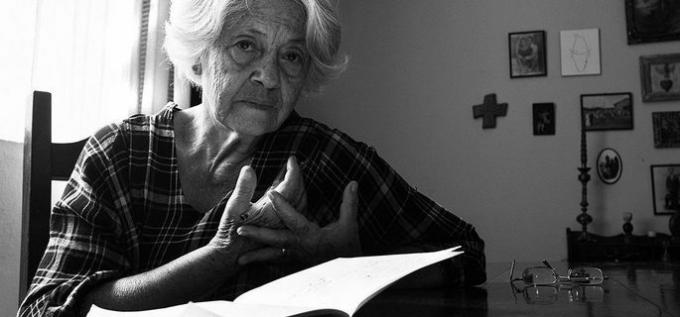Several Brazilian writers created short stories that were called the best and, therefore, reading is mandatory.
Thinking about it, the All Matter selected unmissable short stories from Brazilian literature. Check out!
1. The fortune teller, by Machado de Assis

the plot of the tale The Fortune teller it revolves around a love triangle made up of a couple - Vilela and Rita - and a very close childhood friend of the boy - Camilo.
Afraid of being discovered, Rita is the first to consult a fortune teller. Camilo, who initially mocks his lover, leaves his friend after he begins to receive anonymous letters talking about that extramarital relationship.
Camilo was afraid, and to deflect suspicions, visits to Vilela's house began to become rare. This one noticed her absences. Absences were prolonged, and visits ceased entirely.
After receiving a note from his friend saying that he urgently needed to talk to him, Camilo is distressed and, so, before going to Vilela's house, he decides to do the same as his mistress and also goes to the fortune teller, who the she reassures.
Camilo goes to his friend's house, confident that the relationship was still a secret, but finds Rita dead and bloody. The tale ends with the death of Camilo, murdered by Vilela with two gunshots.
2. Negrinha, by Monteiro Lobato

The tale tells the sad life of a girl, orphaned at 4 years old. She was always scared. While she was alive, the slave mother closed her mouth so that her mistress would not hear her cry.
Her employer was called Dona Inacia. She was a widow and had no children. She didn't like children and their crying took away her patience.
When the girl's mother died, Dona Inácia kept the little one with her, who could barely move.
—Sit down there, and beak, huh?
Negrinha was immobilized in the corner, for hours and hours.
"Arms crossed now, devil!"
Dona Inácia never gave her affection and called her one of the worst possible nicknames, but she claimed to have a charitable heart, for raising the orphan. In addition, those in the house were constantly beating the child, who had his body marked.
One day, Dona Inácia received two little nieces to spend their holidays at her house. It was the first time that Negrinha saw a doll and that she played with it. Unexpectedly, Dona Inácia let the girl play with her nieces.
From then on, and with the return of the nieces, Negrinha fell into a deep sadness. She stopped eating until she let herself die on a mat.
3. Whale, by Graciliano Ramos

The short story is chapter IX of the work Dried lives. It narrates the death of the dog Baleia, who was like a member of the itinerant family, composed of Fabiano, Sinhá Vitória and their two children.
Whale was very thin and her body had gaps of hair. She already walked with a rosary of burnt corn cobs around her neck, which her owner had put on in an attempt to make her better.
In an increasingly worse state, Fabiano decided to kill the animal. The boys feared the worst for Baleia and were taken by their mother to spare them from the scene. Sinhá Vitória tried to cover her children's ears so they wouldn't hear the shot of her father's shotgun, but they were struggling with her.
Fabiano's shot hits the dog's room and from there the narrator describes the difficulties she has to walk after being injured and her feelings in the last moments of life.
She looked at herself again, distressed. What was happening to him? The fog thickened and approached.
4. Christmas Turkey, by Mario de Andrade

Christmas turkey narrates the feeling of guilt that haunts a family after the death of their father. The man was serious and the family lived without economic needs and conflicts, but without experiencing the feeling of happiness.
The narrator, a nineteen-year-old son, who was labeled "crazy" early on, took advantage of the opportunity to suggest a turkey for Christmas dinner, which was inadmissible given the mourning of the family.
Also, turkey was only eaten on feast days. In fact, the family kept the remains the day after the event, as the relatives were in charge of devouring everything and even taking it to those who could not have attended the party.
The “crazy man” suggested a turkey just for them, the five inhabitants of the house. And so it was done, which earned the family the best Christmas they had ever had. Having a turkey all to themselves had brought a “new happiness”.
But when he started serving turkey and offered his mother a full plate, she started crying and made her aunt and sister do the same. And the image of the dead father came to spoil Christmas, starting the fight between the two dead people: the father and the turkey. Finally, pretending to be sad, the narrator starts talking about the father, remembering the sacrifices he had made for the family, which returned the feeling of happiness in the family.
Now everyone ate the turkey with sensuality, because Dad had been very good, he had always sacrificed so much for us, he was a saint that “you, my children, will never be able to repay what you owe your father”, a saint. Dad had become a saint, a pleasant contemplation, an unfailing little star in the sky. It harmed no one else, a pure object of gentle contemplation. The only one killed there was the turkey, dominating, completely victorious.
5. Nativity scene, by Carlos Drummond de Andrade

The tale tells of Dasdores's indecisive choice between setting up a nativity scene or going to Missa do Galo. It was Christmas Eve and, among so many tasks, she didn't have time to do both.
Among Dasdores' duties, the main ones were to take care of his brothers, make sweets in syrup, write letters and assemble the nativity scene - the latter is the determination of a dead aunt. Her parents were always demanding more and more of her, as they believed that this was how a girl should be brought up.
The point is that if she didn't go to mass, she wouldn't see her boyfriend Abelardo, a rare thing to happen.
When starting the ritual of assembling the crib, unwrapping the boxes with the pieces, the friends arrive at home to arrange the time to go to mass, which further delays the tasks of Dosdores.
The girl continues to assemble the crib, fighting against time, while her thoughts are divided between her boyfriend and Baby Jesus.
But Dasdores continues, calm and preoccupied, brooding and broken, bringing the two gods together in the imagination, putting the shepherds in the proper and peculiar position to worship, deciphering Abelard's eyes, Abelard's hands, the prestigious mystery of Abelard's being, the halo that walkers discovered around Abelard's soft hair, Jesus' brown skin, and that cigarette—who put! — burning in the sand of the crib, and that Abelardo was smoking on the other street.
6. Happy Birthday, by Clarice Lispector

This narrative describes the birthday of an 89-year-old matriarch, who lived with her daughter Zilda, the only woman among 7 children.
Zilda had prepared the party for a family that didn't live together, that didn't care for each other. An example of this was one of the children, who did not go to the party so as not to see his brothers and sent his wife to represent him.
Guests ignored the birthday girl, whose daughter had sat her at the table since two in the afternoon, when the first guests began arriving at four. All this to advance your work.
Despite not manifesting, the matriarch was sad and disgusted with her fruits.
How could she give birth to those weak smiling beings without austerity? Anger rumbled in her empty chest. A communist, that's what they were; some communists. She looked at them with her old woman's anger. They looked like rats jostling each other, their family.
At one point, he spits on the floor and, without manners, asks for a glass of wine.
That was the moment when he called attention to himself, as they were having the party between them, with their backs to the old woman, whose presence was ignored all the time and who, in the end, only thought if that day there would be dinner.
7. The young man on the saxophone, by Lygia Fagundes Telles

The protagonist, a truck driver, gets into the habit of eating everyone at a Polish lady's pension, where, in addition to the food was bad, it was frequented by dwarf artists and by flyers who came out picking their teeth, something he hated.
On the first day, he was surprised by sad music played from a saxophone, whereupon he asks a fellow who was playing. James, said to be "the sax boy", a married man who didn't sleep in the same room as his wife, who cheated on him constantly.
The music came from the bedroom and nobody saw the boy, who didn't even go out to eat. The saxophone bothered the protagonist; the music reminded him of a cry for help, like that of a woman giving birth who had long ago given a ride in her truck.
At the boarding house, he found a woman in a very short dress and realized that she was the saxophone boy's wife. Observer, he realized that the music played in the moments when the woman betrayed him and he also arranged a meeting with she, but she made a mistake in the room and ran into her husband, who to her surprise, indicated the room. right.
Outraged, he questioned the man's attitude:
"And you accept all this quietly?" Not reacting? Why don't you give him a good beating, kick him with suitcase and everything in the middle of the street? If it were me, dove, I would have already cracked her in half! I'm sorry to get involved, but you mean you don't do anything?
"I play saxophone."
8. A Nova California, by Lima Barreto

New California narrates the arrival of a mysterious man in a quiet city in Rio de Janeiro. As he didn't speak to anyone, the mystery increased people's curiosity.
Through Chico da Tiara, the postman, the residents knew that the man was called Raimundo Flamel, as he received mail every day - letters, books and magazines - from all over the world. Also, they were aware of some strange utensils in their house - glass balloons, cups like the ones in the pharmacy - because he called a bricklayer to make an oven for him in his dinner.
It turns out that despite being mysterious, it came to be admired by the population, thanks to the apothecary Bastos, who expressed his suspicion that the man was a sage who needed rest to develop his work scientific.
And it was the apothecary that Flamel turned to when he needed someone to witness his discovery: how to make gold using dead bones for that purpose.
That's when the quiet of the small town ended, which without any occurrences of crime, saw the graves of its cemetery being constantly violated. After the reason for breaking into the cemetery became discovered, the entire population searched for bones with the intention of to get rich by starting a great fight between everyone, even between families, leaving only one drunk.
In the morning, the cemetery had more dead than it had taken in in its thirty years of existence. A single person hadn't been there, hadn't killed or desecrated tombs: it was the drunk Belmiro.
9. The Departure, by Osman Lins

The tale tells the departure of a young man from his grandmother's house, a decision he had taken because he was tired of the routine, the limits imposed by the lady, her excessive care and even the affections. He wanted to experience something new, freedom.
His grandmother helped him to pack his suitcase and while she did, he just thought about the fascinating life that awaited him:
... walks, Sundays without mass, work instead of books, women on the beaches, new faces.
After doing the last tidying around the house before going to bed, the grandmother went to cover her grandson, which he reveals that the old lady continues to do when she visits.
The night before departure he had not been able to sleep. Despite the enormous desire to leave that house, something embittered him.
When he left, he took a long time to leave, without understanding the reason, but he did so by kissing his grandmother's hand, who had left the table set with an embroidered tablecloth that was used on their birthdays.
We are sure you will love this text.: 16 greatest modern and contemporary Brazilian poets.
10. No ornaments, by Adélia Prado

no decoration at all it shows the daughter's perception of her mother, a simple person full of quirks. A woman of frail health, she only went to masses at five in the afternoon because she was afraid of the dark, and had the habit of curling a lock of hair. She spent the day crying out for Jesus and was afraid to die.
The mother was a very difficult person to deal with, but she values her studies and demanded that her daughter get the best grades. She was smart herself and liked to read. Therefore, he could ensure simplicity and refused any luxury, but he did not skimp on what was necessary in relation to his daughter's studies.
She was the most difficult woman to mother. Difficult, therefore, to be pleased. She liked me to get only ten and first place. She didn't skimp on these things, it was a first-rate briefcase, a box of twelve pencils and a uniform ordered to be ruffled.
Once the father spoke of his intention to buy a watch for his daughter, but the mother soon ended her plans. When on another occasion he offered his mother a shoe, she placed so many defects that the man had to go to the store three times, once because of the model, once because of the color. Nothing pleased her.
But the worst happened with the offer of the crucifix that the man brought all satisfied to the woman, who when receiving, she replied that she preferred it to be "without any decorations".
Don't stop there. Read other texts related to this topic:
- fantastic tale
- Characteristics of Contemporary Brazilian Literature
- Brazilian Literature: summary, history and literary schools
- 10 classic fairy tales


